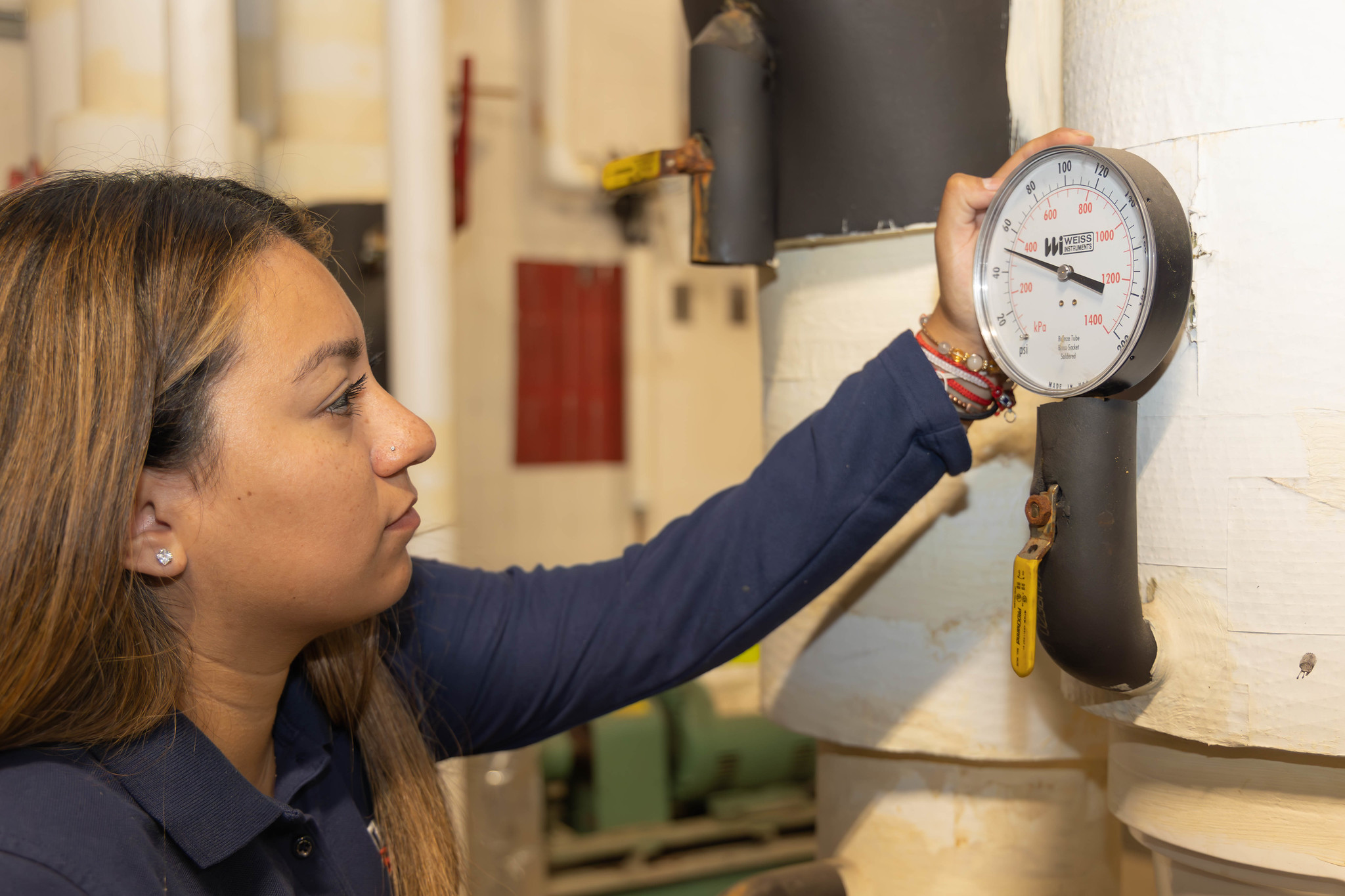Design, build, and maintain climate control systems through hands-on training for a career as a heating, ventilation and air conditioning technician.
What is air conditioning technology?
Installing and servicing heating, air conditioning and refrigeration equipment is the focus of this program. Academic courses, theory courses, and laboratory experiences are designed to promote success in the air conditioning field. BCTC’s program was in the top 20 HVAC schools in the nation.
Students enrolled in the Air Conditioning Technology program must achieve a minimum grade of C in each technical course.

The Heating, Ventilation, Air Conditioning and Refrigeration industry has a high demand for qualified technicians and Installers.
Employment of heating, air conditioning, and refrigeration mechanics and installers is projected to grow 14 percent from 2014 to 2024, much faster than the average for all occupations.
Candidates familiar with computers and electronics and those with good troubleshooting skills will have the best job opportunities as employers continue to have difficulty finding qualified technicians to install, maintain, and repair complex new systems.
- Air Conditioning Technician
- Building Automation Technician
- Heating, Ventilation, and AC Mechanic (HVAC)
- Commercial Service Technician
- Residential Service Technician
- Domestic Air Conditioner Installer
- Domestic Furnace Installer
- Environmental System Repair Helper
- Refrigeration Mechanic
Getting Started
Frequently Asked Questions (FAQ)
What are my degree, diploma, and certificate options?
How Do I Pay For This?
What Else Do I Need to Know?
Air Conditioning Technology Tracks
The Air Conditioning Technology Program at BCTC has been recognized as one of the Top 20 HVAC Educational Programs in the Nation! We are also the only college in the nation to offer all the below listed programs at one institution.
Our Air Conditioning Technology curriculum has been designed to provide a balanced learning experience. Lecture and lab courses are used to enhance learning and provide necessary applied experiences. Each course is structured to prepare students for the next more advanced course as they move through the program. The use of modern technology, as well as computer skills are a large part of the educational experience. These skills are also needed for future advancement in the HVAC field.
Specific Pathways have been designed to allow students to focus on an area of education. These Pathways better prepared students for their desired career within the vast world of HVAC/R related careers...
- ACR 100 Refrigeration Fundamentals
- ACR 101 Refrigeration Fundamentals Lab
- ACR 102 HVAC Electricity
- ACR 103 HVAC Electricity Lab
- CIT 105 Introduction to Computers
Residential HVAC focused Pathway for future Service Technicians.
- ACR 130 Electrical Components
- ACR 131 Electrical Components Lab
- ACR 250 Cooling & Dehumidification
- ACR 251 Cooling & Dehumidification Lab
- ACR 260 Heating & Dehumidification
- ACR 262 Heating & Dehumidification Lab
- ACR 270 Heat Pump Applications
- ACR 271 Heat Pump Applications Lab
- ACR 170 Heat Load and Duct Design
- ACR 290 Journeymen Preparation
Commercial HVAC focused Pathway for future Commercial Service Technicians.
- EET 270 Electrical Motor Controls I
- EET 271 Electrical Motor Controls I Lab
- ACR 260 Boilers
- ACR 207 Commercial HVAC Systems
- ACR 208 Chillers
- ACR 209 Manual N Commercial Load Calculation and Design
- ACR 290 Journeyman Preparation
Commercial and Controls focused Pathway for future Dual area Technicians.
- CIT 160 Intro to Networking Concepts
- EET 270 Electrical Motor Controls I
- EET 271 Electrical Motor Controls I Lab
- EET 276 Programmable Logic Controllers
- EET 277 Programmable Logic Controllers Lab
- ACR 206 Boilers
- ACR 207 Commercial HVAC Systems
- ACR 208 Chillers
- ACR 237 Building Controls I
- ACR 238 Building Controls II
- ACR 290 Journey Preparation
15 hours of general education courses and various technical electives required*
Commercial Refrigeration Mechanic Pathway for Future Service Technicians.
- ACR 130 Electrical Components
- ACR 131 Electrical Components
- ACR 200 Commercial Refrigeration
- ACR 201 Commercial Refrigeration Lab
- ACR 210 Ice Machines
- ACR 250 Cooling and Dehumidification
- ACR 251 Cooling and Dehumidification Lab
- Environmental Controls Repair Helper
- Environmental Controls System Servicer
- Domestic Air Conditioner & Furnace Installer
- Diploma – Refrigeration and Air Conditioning Mechanic
Continuing Education
The HVAC field requires continuing education to keep up with new technology, code requirements and safety. We offer a wide range of CEU and Licensing Preparation courses to the community.
These classes are offered through our Workforce Solutions department.
For more information please call (859) 246-6666.
License Exam Preparation
- HVAC Exam Preparation for Journeyman Licensing (new window)
- HVAC Exam Preparation for Master Licensing (new window)
Continuing Education
Licensure Exams
Our Assessment Center at Leestown Campus is a testing provider for all of Kentucky.
They offer HVAC, as well as many other licensing examinations.
Licensing & Certification
- Students will earn the below listed certifications and hours.
- OSHA 10-hour Construction Safety Certification
- EPA 608 Universal Certification for Refrigerant Recovery
- Employment Ready National Competency Certification in Air Conditioning Technology
- Completion of degree, diploma or Domestic Air Conditioner and Furnace installer cert. will earn you 1500 hours of work experience toward the 3000 hours required for your Journeyman License. (1500 is the most hours that can be earn through education and can only be attained at a KCTCS college)
- You will take the Journeyman Prep course and the Journeyman Test as your exit exam for the program.
Courses Offered
Our Air Conditioning Technology curriculum has been designed to provide a balanced learning experience. Lecture and lab courses are used to enhance learning and provide necessary applied experiences.
Each course is structured to prepare students for the next more advanced course as they move through the program.
The use of new technology, as well as computer skills are a large part of the educational experience. These skills are also needed for future advancement in the HVAC field.
- ACR 100 Refrigeration Fundamentals
- ACR 101 Refrigeration Fundamentals Lab
- ACR 102 HVAC Electricity
- ACR 103 HVAC Electricity Lab
- ACR 130 Electrical Components
- ACR 131 Electrical Components Lab
- ACR 250 Cooling & Dehumidification
- ACR 251 Cooling & Dehumidification Lab
- ACR 260 Heating & Dehumidification
- ACR 261 Heating & Dehumidification Lab
- ACR 270 Heat Pump Applications
- ACR 271 Heat Pump Applications Lab
- ACR 170 Heat Load and Duct Design
- ACR 290 Journeymen Preparation
- ACR 112 Sheet Metal Fabrication
- ACR 113 Sheet Metal Fabrication Lab
- ACR 200 Commercial Refrigeration
- ACR 201 Commercial Refrigeration Lab
- ACR 210 Ice Machines
- ACR 299 Cooperative Education Experience
Length of Program
Our program is student paced with some students completing the HVAC curriculum in 3 semesters. Our night program may take 5 semesters to complete based on student desired course load.
You can earn an associate in applied science degree in two years if you maintain full-time status.
This information should not be considered a substitute for the KCTCS Catalog. You should always choose classes in cooperation with your faculty advisor to ensure that you meet all degree requirements.

